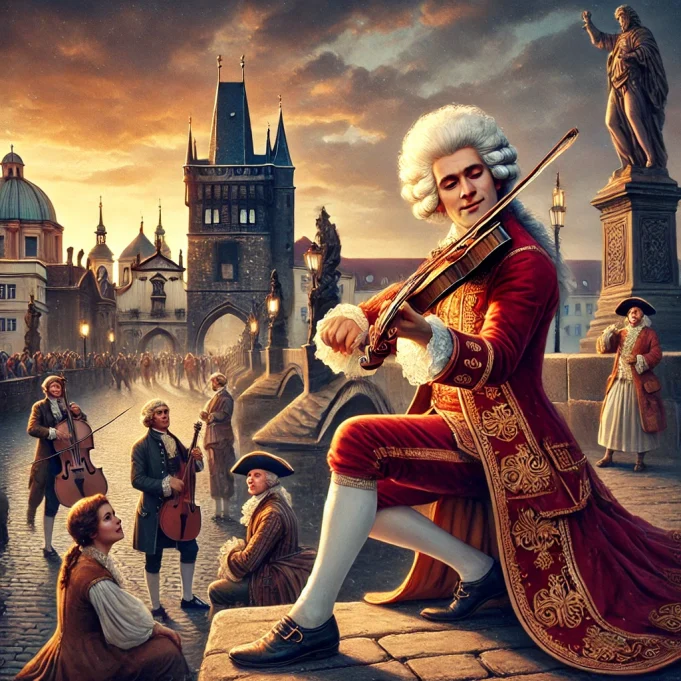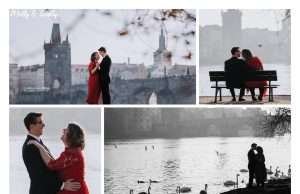Mozart’s Love Affair with Prague: A Musical Romance
In the late 18th century, Prague was a city pulsating with music, culture, and romance—a perfect haven for Wolfgang Amadeus Mozart, one of history’s greatest composers. While Vienna was his residence, it was Prague that truly stole his heart. The city embraced his genius with open arms, offering him adoration, inspiration, and a sense of belonging he rarely found elsewhere. So, why did Mozart love Prague so deeply? Let’s dive into the details of his visits, uncover the reasons behind his affection, and explore the eye-catching stories that make this connection so captivating.
Mozart’s First Visit: The Triumph of The Marriage of Figaro
Mozart’s love story with Prague began with an opera: The Marriage of Figaro. First performed in Vienna in 1786, it received a tepid response—critics called it overly complex. But when it reached Prague later that year, it exploded into a cultural phenomenon. The city’s newspapers gushed about its brilliance, with one declaring, “No piece has ever caused such a sensation.” The opera’s melodies echoed through Prague’s streets, hummed by everyday citizens.
This overwhelming enthusiasm prompted an extraordinary invitation: the Prague orchestra and music lovers funded Mozart’s trip to see the spectacle for himself. In January 1787, he arrived and was greeted like a rock star. During his visit, he premiered his Symphony No. 38 in D major—now known as the “Prague Symphony”—to a mesmerized audience. Mozart later wrote that this day was among the happiest of his life. Unlike Vienna’s dismissive elite, Prague celebrated his “too many notes” as pure brilliance.

The Premiere of Don Giovanni: A Masterpiece Born in Prague
The success of Figaro sparked an even greater chapter in Mozart’s Prague saga. The city commissioned him to create a new opera, and in October 1787, he returned to premiere Don Giovanni. This dark, daring work debuted at the Estates Theatre on October 29 and was an instant masterpiece. Contemporary reviews raved, “Prague has never heard the like,” cementing Mozart’s status as a local hero.
What’s fascinating is how Don Giovanni reflected Prague’s musical soul. The city was famous for its exceptional wind instrument players, and Mozart tailored the opera’s score to showcase their talent. He even slipped in a cheeky nod to his Prague fans: in the final act, the character Leporello recognizes a tune from Figaro, saying, “Now this is one I know very well.” The audience roared with delight, sharing an inside joke with their beloved composer.
Mozart’s Friends and Connections: A Home Away from Home
Prague wasn’t just a stage for Mozart’s music—it was a sanctuary of friendship. Among his closest allies were Franz Xaver and Josepha Duschek, a composer and soprano duo who welcomed him into their villa, Bertramka. This retreat offered Mozart a respite from Vienna’s pressures, and it was here that he penned works like the aria Bella mia fiamma, addio. One charming tale claims Josepha once locked Mozart in a gazebo until he finished the piece—a playful nudge from a friend who knew his genius.
Mozart also mingled with Prague’s aristocracy, including Count Thun and Count Clam-Gallas, who hosted him in their grand palaces. These bonds gave him a warmth and appreciation that Vienna’s competitive court rarely provided, making Prague feel like a true second home.
The Musical Culture of Prague: A Perfect Match for Mozart
Why did Prague adore Mozart when Vienna often overlooked him? The answer lies in the city’s extraordinary musical culture. Bohemia, the region around Prague, boasted a tradition of widespread music education—children learned to sing and play instruments as part of their schooling. This created a sophisticated audience that could grasp the intricacies of Mozart’s compositions, from his bold harmonies to his emotional depth.
While Vienna’s nobility sometimes scoffed at his “extravagant” style, Prague’s listeners embraced it wholeheartedly. Librettist Lorenzo Da Ponte noted, “The pieces which were admired least of all in other countries were regarded by [Praguers] as things divine.” This mutual understanding fueled Mozart’s love for the city—he famously said, “My Praguers understand me,” a sentiment that captures their unique connection.
Mozart’s Legacy in Prague: A Love That Endures
Though Mozart visited Prague only a few times before his death in 1791, his impact was indelible. When he passed away, the city mourned as if losing one of its own. On December 14, 1791, thousands gathered at St. Nicholas Church for a memorial service, where over 100 musicians performed a Requiem mass—free of charge—as a tribute to their hero.
Prague’s devotion didn’t end there. In 1837, it established Europe’s first Mozart memorial, now part of the National Library. The Estates Theatre still stages Don Giovanni, and festivals celebrate his music year-round. From museums to concert halls, Prague keeps Mozart’s spirit alive, a testament to a love that time can’t erase.
A Love Story for the Ages
Mozart’s affection for Prague wasn’t just about professional success—it was personal, profound, and reciprocal. The city gave him triumphs like The Marriage of Figaro I Don Giovanni, friendships that sustained him, and an audience that truly “understood” his art. In return, Mozart left behind a legacy that still resonates in Prague’s streets and theaters.
Today, as you stroll through Prague’s cobblestone lanes or hear his melodies drift from a concert hall, you can feel the echoes of this extraordinary bond. Mozart and Prague weren’t just a composer and a city—they were a musical romance, a symphony of genius and gratitude that continues to captivate the world.
Wolfgang Amadeusz Mozart odwiedził Pragę kilka razy w ciągu swojego życia i miał ścisły związek z miastem. Nie mieszkał jednak na stałe w Pradze. Oto kilka informacji o pobycie Mozarta w Pradze:
- Pierwsza wizyta (styczeń 1787): Pierwsza wizyta Mozarta w Pradze miała miejsce w styczniu 1787 r., kiedy dyrygował swoją operą „Don Giovanni” (znaną również jako „Don Giovanni, K. 527”) w Teatrze Estates (Stavovské divadlo) w Pradze. Wizyta ta zakończyła się znaczącym sukcesem, a „Don Giovanni” został dobrze przyjęty przez praską publiczność. Podczas tej wizyty Mozart spędził kilka tygodni w Pradze.
- Druga wizyta (sierpień 1787): Mozart powrócił do Pragi w sierpniu 1787 roku na premierę swojej opery „La clemenza di Tito” (Łaskawość Tytusa) w Teatrze Estates. Opera ta nie odniosła jednak takiego sukcesu jak „Don Giovanni”.
- Późniejsze połączenia: Mozart nadal miał silny związek z Pragą, a jego muzyka pozostała popularna w mieście. Korespondował z praskimi przyjaciółmi i kompozytorami, takimi jak Josef Mysliveček i rodzina Dussek. Jego utwory były często wykonywane w Pradze nawet po jego śmierci.
Mozart nie miał stałego miejsca zamieszkania w Pradze, ale podczas swoich wizyt nocował w różnych obiektach noclegowych. Miał w Pradze przyjaciół i wielbicieli, którzy gościli go podczas jego wizyt.
Chociaż Mozart nie mieszkał w Pradze przez dłuższy czas, pobyt w tym mieście był znaczący w jego karierze, a miasto uhonorowało go pomnikami i muzeami poświęconymi jego pamięci.










